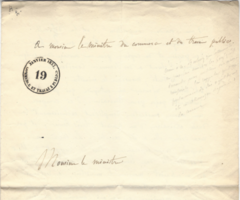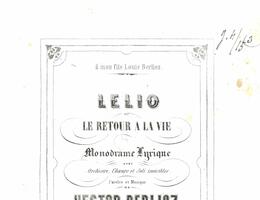Lélio ou Le Retour à la vie
Melologue for two tenors, baritone, chorus, piano and orchestra.
1. Le Pêcheur, pour ténor et piano – 2. Chœur d’ombres, pour chœur et orchestre – 3. Chanson de brigands, pour baryton, chœur d’hommes et orchestre – 4. Chant de bonheur, pour ténor et orchestre – 5. La Harpe éolienne, pour clarinette, harpe et cordes – 6. Fantaisie sur La Tempête de Shakespeare, pour chœur et orchestre
Épisode de la vie d’un artiste, a progamme consisting of the Symphonie fantastique and Lélio ou le retour à la vie, was a success on its performance in Paris on 9 December 1832. Lélio, written as a sequel to the Symphonie fantastique, was premièred on that occasion. It is described as a “melologue”, a term coined by Thomas Moore, referring to vocal and instrumental music interspersed with spoken declamation. With the exception of Le Pêcheur (a French translation of Goethe’s ballad Der Fischer), Berlioz wrote all the spoken and sung texts himself. He projected himself into Lélio, his “double”, a part taken by a narrator. Sublimating his passion for Harriet Smithson (the work makes use of the famous idée fixe from the Symphonie fantastique), but also for the pianist Marie Moke, the declaimed passages alternate with six musical pieces, each written for different forces. Berlioz was a master when it came to reusing his own compositions, and Lélio includes several pieces written some years previously. Chœur d'ombres reuses music from his cantata written for the Prix de Rome, La Mort de Cléopâtre (1829), while Chant de bonheur and La harpe éolienne rework music from another Prix de Rome cantata, La Mort d'Orphée (1827). Chanson de brigands takes up a Chanson des pirates of 1829 (now lost). Fantaisie sur “La Tempête” de Shakespeare, with the piano (four hands) used as an orchestral instrument, dates from 1830. In 1855 in Weimar, Liszt conducted the first performance of Lélio in conformity with the composer’s wishes: with the narrator on stage and the orchestra, chorus and solo singers concealed behind a curtain until the finale. Berlioz was never again to hear his melologue thus performed.
Documents and archives

Correspondence, Manuscript document

